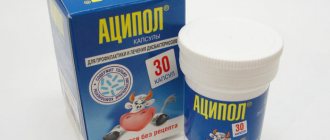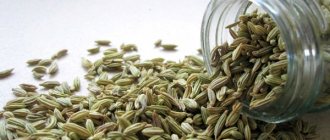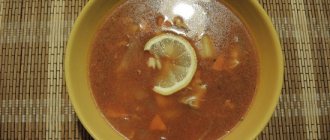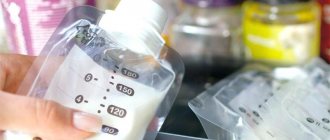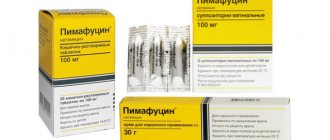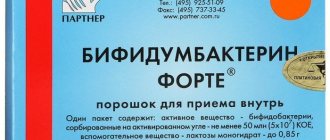Medicinal plants LLC "MK "Folk Medicine" Fennel fruits, 50 g - review
I encountered the problem of colic almost immediately after the birth of my first child.
Then I was not particularly prepared for their appearance; for me it was not so much a surprise, but some kind of serious problem that had to be solved with the help of a large number of improvised drugs and medications. Colic bothered the child for four months and during this period I tried a lot of pharmaceutical drugs: “Baby Calm” , “Bobotik” , “Plantex” , “Microlax”.
In addition, she massaged her tummy every day, periodically placed a heating pad on her tummy, and in particularly difficult cases she resorted to a gas tube.
None of these remedies worked 100% and did not give long-term results; the colic returned again and again, until the intestines adapted to work on their own. As I understand it, you just need to get over colic, although of course you need to help the child.
When my second baby was born, I didn’t wait for him to start having colic, but decided to take action in advance.
On the advice of a friend, I bought a package of fennel fruits and began taking a decoction of them, alternating it with tea with milk, because in addition to eliminating increased gas formation in the intestines, fennel has the property of stimulating lactation, which was very necessary for me, since the child turned out to be appetizing. With my daughter, to increase lactation, I used a special supplementary food for nursing mothers “Nutrimil Mama” and the herbal mixture “Lactavit”, they didn’t help much then.
Fennel fruits.
The fennel plant (pharmaceutical dill) contains valuable seeds for a nursing mother and her child, which, in addition to essential oils, contain a large amount of fatty acids, plant proteins, vitamins B, C, B-keratin and other substances.
In most cases, fennel tea is useful for mothers as a means of normalizing lactation. Fennel fruits have this quality due to the effect of the substances they contain on the hormone prolactin, which is responsible for the formation of breast milk.
Drinks containing dill have a beneficial effect on the central system. A calm mother, as a rule, does not have problems with lactation. One of the main advantages of the drink, which is prescribed to most babies, is its choleretic effectiveness, the ability to normalize digestion not only in the baby, but also in his mother.
There are quite a lot of manufacturers producing fennel boxes; I don’t think they differ significantly in quality, much less in properties. I got the manufacturer “Traditional Medicine”.
Fennel fruits.
The package contains 50 grams of fruits, very reminiscent of dill seeds (these are plants of the same genus), packed in a paper bag.
Fennel fruits, packaging.
Fennel fruits, packaging.
As it turned out, 50 grams is not such a large amount, fortunately the cost is not off the charts, fluctuating around 40 rubles, so purchasing even a few packages will not greatly impact the family budget. Although you can’t buy any means at any price, as long as the child does not suffer from stomach pain.
Medicines used for colic in babies.
Information about the purpose and method of use of the drug is on the packaging.
Fennel fruits, indications.
Purpose:
It has a carminative, antispasmodic, and expectorant effect. Used for flatulence (as a carminative), inflammatory diseases of the upper respiratory tract (as an expectorant) - as part of complex therapy.
Contraindications:
Hypersensitivity to the components of the drug.
Fennel fruits, application.
Fennel seeds are quite large; when brewed in water, they swell even more and settle to the bottom, so in principle, the finished infusion or decoction does not need to be filtered.
Fennel fruits, appearance.
The ready-to-use solution has a greenish-cinnamon tint, a pleasant spicy aroma and herbal taste with a sweet aftertaste. It is somewhat reminiscent of anise, which I personally really like.
Fennel fruits and infusion of them.
By the way, in combination with anise, the effect of the infusion is only enhanced, so these herbs can be used in combination, brewed in equal proportions. They are part of the well-known drug “Baby Calm” .
I prepared an infusion of fennel fruits in the morning and drank it little by little throughout the day, replacing regular tea with it. I can’t say that fennel significantly increased the amount of milk, but I can say with complete confidence that the baby’s tummy began to hurt less often and the gas came out easier.
Fennel fruits, infusion of them.
The child became calmer, was less capricious, fell asleep faster and slept more soundly. It was necessary to use “Bobotik” as an emergency remedy for colic less often.
I was pleased with the results of using fennel. As it turns out, the substances it contains can actually penetrate into breast milk and have a beneficial effect on the baby’s digestion.
However, you should not neglect all the well-known classical non-drug methods of dealing with colic:
– it is necessary to properly attach the baby to the breast, which helps to reduce the swallowing of air during feeding;
– after feeding, it is necessary to lift and hold the baby in a “column” in an upright position;
– it is advisable to place the baby on his tummy more often, especially before feeding;
– you need to do a light massage of the tummy clockwise, and then bend the legs at the knees, bringing them to the tummy;
– if colic does occur, you can put a warm diaper heated with an iron on the baby’s stomach, or press his tummy to you;
- as a last resort, you can use a gas outlet tube, inserting it 2 cm into the rectum and gently massaging the tummy.
No matter how much colic annoys the baby and his parents, do not forget that this phenomenon is temporary, and soon the baby’s digestion will improve, and peace will come to the house (exactly until the teeth begin to erupt).
Tea for nursing mothers with fennel during breastfeeding for colic, recipe, reviews
Many mothers have heard about dill water and its beneficial properties. It is believed that it increases lactation, helps fight infant colic, and improves the mother’s condition. What is it, what is it made of and how does it actually work?
Fennel - what is it, its properties
Fennel is often confused with dill, but although they are similar in appearance, they are still different plants. Fennel is mainly known as a seasoning - it is added to baked goods, salads, meat, fish, sauces, soups, and drinks. It adds a pleasant spicy sweet taste and aroma to any dish.
Fennel is sometimes confused with dill due to their similar appearance.
But in addition to its wonderful taste, fennel is also valued for its medicinal properties. All its parts contain a large amount of microelements, vitamins and fatty acids useful for humans. The highest concentration of this is in the seeds, which is why they are mainly used in folk medicine.
Fennel seeds contain the highest concentration of nutrients
The main component of fennel seeds is anethole, which has an anti-inflammatory effect. It is important to remember that its overdose can lead to seizures.
Fennel is a storehouse of nutrients. When used correctly, it helps get rid of colds, normalize blood pressure, improve sleep, dull the feeling of hunger, relieve irritability and anxiety, have a positive effect on the reproductive system, and have a rejuvenating effect.
Fennel tea for lactation and colic in children
In the recommendations that nursing mothers share with each other, fennel tea is far from the last place. And there is a reason for this - with regular use of this drink, you can notice its beneficial effect on the baby’s digestive system, and on the amount of breast milk produced by the mother.
Fennel increases the level of digestive juices in the gastrointestinal tract, improves the quality of its work, improves intestinal motility, and reduces gas formation.
Since the beneficial substances of the plant enter the blood and then into breast milk, they have these beneficial effects not only on the mother’s body, but also on the baby’s body.
Typically, nursing mothers do not give their children anything other than breast milk until they are 6 months old, so fennel tea becomes an indispensable aid in the fight against colic - after all, it is not the baby who needs to drink it, but the mother herself.
Fennel helps increase lactation
Fennel stimulates the production of female sex hormones in mothers, in particular prolactin, the hormone responsible for lactation. Studies conducted by scientists have proven that while taking fennel, women increase the amount of milk they produce, and after finishing the intake, the volume of breast milk returned to its original state.
In addition, fennel dilates peripheral blood vessels - this promotes blood flow to the mammary glands and relieves spasms from the ducts, which has a positive effect on the production of breast milk.
To get a positive result, you don’t need to switch to a diet of fennel alone; it’s enough to drink tea with this wonderful plant every day.
The calming effect of fennel also has an indirect effect on improving breastfeeding - by relaxing the nursing mother, improving her mood, relieving anxiety and irritability, it allows her to concentrate on lactation. The absence of negative psycho-emotional factors has a positive effect on the production and separation of breast milk.
At about a month old, my daughter began to develop increased gas production, which bothered her greatly - her stomach was seething, she often cried, tucking her legs in.
I was afraid to give medicine to such a small child and decided to try it through milk - brew and drink fennel seeds.
I bought filter bags with fennel at the pharmacy, brewed the bag and drank 2 tablespoons of it before each feeding. The next day, my daughter’s condition improved, and the gurgling in her stomach decreased.
How to brew, how to take
In the pharmacy assortment you can find both ready-made fennel teas from various manufacturers, as well as fennel seed collections intended for brewing.
Ready-made teas are available in three different formats - granulated, loose and bagged. There is no particular difference between the release forms, so you should choose the form in which the nursing mother is used to drinking regular tea.
Granulated tea allows you to avoid wasting time on brewing; it instantly dissolves in water and is ready to drink. In bagged form, tea is packaged in bags for single use.
If mom is used to brewing loose leaf tea, then in this case she can choose the loose format of tea with fennel.
There are a lot of manufacturers of fennel teas; everyone can choose an option to suit every taste and budget. Thus, the most famous and often found on the shelves are Hipp, Babushkino Lukoshko, Humana, Bebivita, Heinz. They differ in composition, so each mother should choose fennel tea on her own according to her needs and individual characteristics.
Photo gallery: ready-made fennel teas
Hipp tea is available in the form of granules - just dissolve them in hot water Babushkino Lukoshko - tea for nursing mothers made in Russia Bebivita - an inexpensive and tasty product
You can also find ready-made filter bags with fennel seeds in pharmacies - they can be brewed and drunk like regular tea. Just pour boiling water over the bag and let it sit for a few minutes, and the tasty and healthy drink is ready.
Ready-made filter bags are convenient and easy to brew
In addition, you can always make your own herbal tea - for this, buy fennel seeds and other necessary ingredients at the pharmacy. Each woman can choose a unique combination of herbs and plants that is suitable specifically for her body. Examples of fennel tea recipes:
- Brew a tablespoon of fennel seeds with a glass of boiling water and leave for 2 hours, after which strain the drink and restore with boiled water to the previous volume;
- Grind 2 tablespoons of seeds, add a pinch of salt and nutmeg, pour a glass of hot milk, leave for 1-2 hours;
- Grind 20 grams of fennel, fenugreek and dill seeds, pour a glass of boiling water, leave in a thermos for 2-3 hours, then dilute with boiled warm water in a ratio of 1 to 3.
The resulting infusions are usually taken 15–20 minutes before feeding the child, 2 tablespoons each.
Anti-colic teas for newborns
Summary of the article
The problem of colic in newborns did not arise yesterday or today. Back in the days when most people had no idea about medications, mothers knew how to cope with the symptoms of colic in children using folk remedies, and also knew how to reduce or prevent their manifestations by eliminating one of the causes of colic - swallowing air during feeding.
So, to prevent colic, which can occur due to air entering the gastrointestinal tract during feeding, the mother can take the following measures:
- apply it correctly to the baby's breast so that he does not swallow air along with the milk. To do this, make sure that the baby completely or almost completely grasps the nipple's areola. If the child is bottle-fed, it is advisable to use anti-colic bottles;
- Before feeding, place the baby on his tummy and leave him in this position for a while. If the baby starts to cry, try to distract him so that the duration of lying on his stomach at first is at least 5 minutes. Gradually the time can be increased to half an hour;
- After feeding, you need to hold the baby upright so that he can burp out excess air. This recommendation applies more to formula-fed babies or babies with frequent regurgitation. If a baby is breastfed, it is difficult to overfeed him and thus he is much less likely to regurgitate.
Tummy massage and exercises for colic
There is a special tummy massage technique that is necessary not only to combat intestinal colic, but also to generally strengthen the body. With the help of massage, food moves more actively through the intestines, and air comes out without difficulty and does not create spasms.
Mom or dad can do the massage themselves - the technique is not complicated. Before the procedure, the baby's tummy needs to be warmed up a little. To do this, apply a warm diaper to it, but it is better to use a regular or salt heating pad, as they retain heat longer.
For massage, you should place the child on a hard, stable surface (for example, on a couch), which must first be covered with a diaper. This is necessary, since after the procedure a small ventricle can present surprises.
The massage should be careful and soft. It must be done with warm hands to make the baby feel good. Read more about massage techniques.
Special exercises will help get rid of excess gases in the newborn’s stomach and make defecation easier. With the help of exercises, the necessary pressure is provided on the abdominal wall, which helps cleanse the stomach. They can be done when the mother sees that the baby has begun to be bothered by colic:
- "Bike". The baby is placed on his back, taken by the feet with his hands and his legs are bent, pressing his knees to his stomach. At the same time, it can be rolled from one side to the other.
- Exercise with a ball. The baby is placed on an inflatable ball, tummy down. In this case, the child needs to be held and slightly rolled. Light pressure ensures proper bowel function.
- Exercise with warming the tummy. Performed on a flat, slightly soft surface. The baby is placed on his stomach, and a warm rolled up towel or a salt heating pad is placed under him. The legs need to be spread apart and at the same time pulled towards the tummy.
Perform each action 5-7 times.
massage for colic
Herbs for colic in a newborn
Among folk remedies for treating colic, medicinal plants are considered quite effective. Here are some of the most effective recipes.
Chamomile
You will need the flowers of the plant. They need to be dried in the sun. Then take 15 grams and pour 400 ml of boiling water. The liquid should be kept over low heat and brought to a boil. Then the drug should sit for an hour, after which it can be filtered. The baby should be given one teaspoon three times a day.
Fennel
Take 10 grams of fennel fruit and pour 200 ml of boiling water. The container is left warm for one hour. The drug is filtered and given to the baby no more than 10 ml before meals three times a day. Read in more detail about the properties of dill water based on fennel fruits (dill), prepared at home and in pharmaceutical preparations.
Dill
Dill water is prepared from the plant. To do this, you need to brew one teaspoon of dill seeds in boiling water. You will need 200 ml of water. The composition should be boiled over low heat for 20 minutes. After this, the broth should sit for 30 minutes. Then you need to strain it. It is better to give the baby 10 ml of the resulting liquid three times a day.
Tea made from mint, anise, cumin and valerian root
Chopped dried mint should be mixed in equal proportions with cumin, anise seeds and valerian root. Pour 20 grams of the mixture into a glass and brew in boiling water. Leave to infuse for 30 minutes. Give the newborn a teaspoon of strained liquid three times before meals.
Sage tea
You need to take sage leaves and herbs, finely chop them to make one tablespoon. Pour a cup of boiling water and leave for 50 minutes. Afterwards, the tincture should be filtered. The child should be given one tablespoon of water every two hours.
Important! Click herbs should be used very carefully. If there is any suspicion of individual intolerance, you should stop taking it immediately.
There are also ready-made baby teas based on extracts of medicinal plants for colic (Humana, Hipp, Bebivita, etc.), as well as herbal remedies in which the main active ingredient is of natural origin (Plantex, Baby Calm, Colic Calm).
Warmth against colic
Something warm will help soothe the pain in your tummy. There are three main ways to do this:
- The baby is placed on its tummy to the mother's breast. From here the baby receives the necessary portion of heat, which warms the sore spot. In addition, the baby is calmed by tactile communication with his mother - he feels the presence of a loved one.
- A salt heating pad will also help. It heats up to the optimal temperature and transfers heat to the baby. This heating pad is sold in every pharmacy.
- Warm diaper. It works on the principle of a salt heating pad. The fabric is ironed, folded and applied to the tummy.
Diet for mom
Treatment of colic in a newborn will not bring results if the mother does not reconsider her diet. A woman who breastfeeds her child must follow a special diet. To do this, you should give up milk, many fruits, vegetables, and sweets. Read about what a nursing mother can and cannot eat in this article.
If all these measures do not help, then after consulting a doctor, you can try using medications based on dimethicone and simethicone.
Source: https://shokomania.ru/chai-ot-kolikov-dlja-novorozhdennyh/


